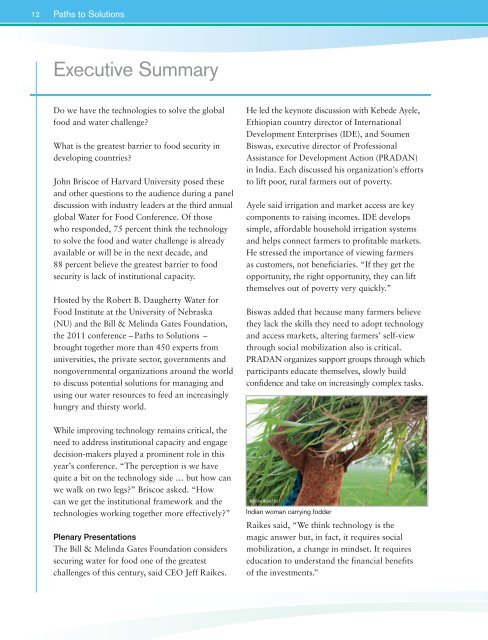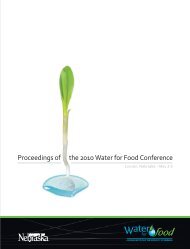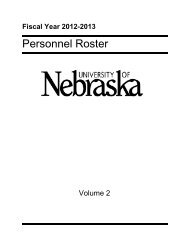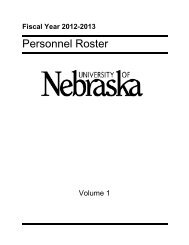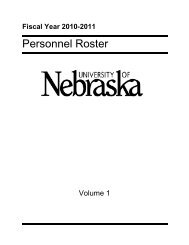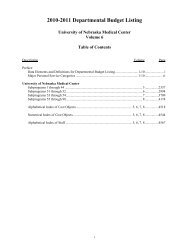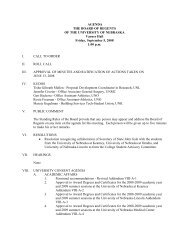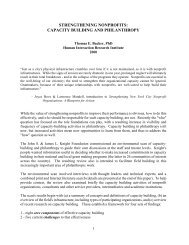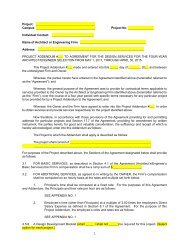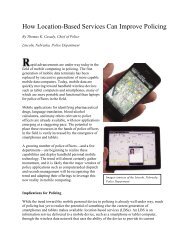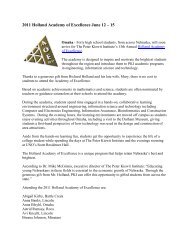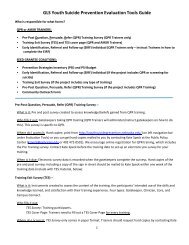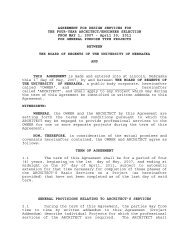Full Version - The Water for Food Institute - University of Nebraska
Full Version - The Water for Food Institute - University of Nebraska
Full Version - The Water for Food Institute - University of Nebraska
You also want an ePaper? Increase the reach of your titles
YUMPU automatically turns print PDFs into web optimized ePapers that Google loves.
12<br />
Paths to Solutions<br />
Executive Summary<br />
Do we have the technologies to solve the global<br />
food and water challenge?<br />
What is the greatest barrier to food security in<br />
developing countries?<br />
John Briscoe <strong>of</strong> Harvard <strong>University</strong> posed these<br />
and other questions to the audience during a panel<br />
discussion with industry leaders at the third annual<br />
global <strong>Water</strong> <strong>for</strong> <strong>Food</strong> Conference. Of those<br />
who responded, 75 percent think the technology<br />
to solve the food and water challenge is already<br />
available or will be in the next decade, and<br />
88 percent believe the greatest barrier to food<br />
security is lack <strong>of</strong> institutional capacity.<br />
Hosted by the Robert B. Daugherty <strong>Water</strong> <strong>for</strong><br />
<strong>Food</strong> <strong>Institute</strong> at the <strong>University</strong> <strong>of</strong> <strong>Nebraska</strong><br />
(NU) and the Bill & Melinda Gates Foundation,<br />
the 2011 conference – Paths to Solutions –<br />
brought together more than 450 experts from<br />
universities, the private sector, governments and<br />
nongovernmental organizations around the world<br />
to discuss potential solutions <strong>for</strong> managing and<br />
using our water resources to feed an increasingly<br />
hungry and thirsty world.<br />
While improving technology remains critical, the<br />
need to address institutional capacity and engage<br />
decision-makers played a prominent role in this<br />
year’s conference. “<strong>The</strong> perception is we have<br />
quite a bit on the technology side … but how can<br />
we walk on two legs?” Briscoe asked. “How<br />
can we get the institutional framework and the<br />
technologies working together more effectively?”<br />
Plenary Presentations<br />
<strong>The</strong> Bill & Melinda Gates Foundation considers<br />
securing water <strong>for</strong> food one <strong>of</strong> the greatest<br />
challenges <strong>of</strong> this century, said CEO Jeff Raikes.<br />
He led the keynote discussion with Kebede Ayele,<br />
Ethiopian country director <strong>of</strong> International<br />
Development Enterprises (IDE), and Soumen<br />
Biswas, executive director <strong>of</strong> Pr<strong>of</strong>essional<br />
Assistance <strong>for</strong> Development Action (PRADAN)<br />
in India. Each discussed his organization’s ef<strong>for</strong>ts<br />
to lift poor, rural farmers out <strong>of</strong> poverty.<br />
Ayele said irrigation and market access are key<br />
components to raising incomes. IDE develops<br />
simple, af<strong>for</strong>dable household irrigation systems<br />
and helps connect farmers to pr<strong>of</strong>itable markets.<br />
He stressed the importance <strong>of</strong> viewing farmers<br />
as customers, not beneficiaries. “If they get the<br />
opportunity, the right opportunity, they can lift<br />
themselves out <strong>of</strong> poverty very quickly.”<br />
Biswas added that because many farmers believe<br />
they lack the skills they need to adopt technology<br />
and access markets, altering farmers’ self-view<br />
through social mobilization also is critical.<br />
PRADAN organizes support groups through which<br />
participants educate themselves, slowly build<br />
confidence and take on increasingly complex tasks.<br />
Matthew Masin/Flickr<br />
Indian woman carrying fodder<br />
Raikes said, “We think technology is the<br />
magic answer but, in fact, it requires social<br />
mobilization, a change in mindset. It requires<br />
education to understand the financial benefits<br />
<strong>of</strong> the investments.”


